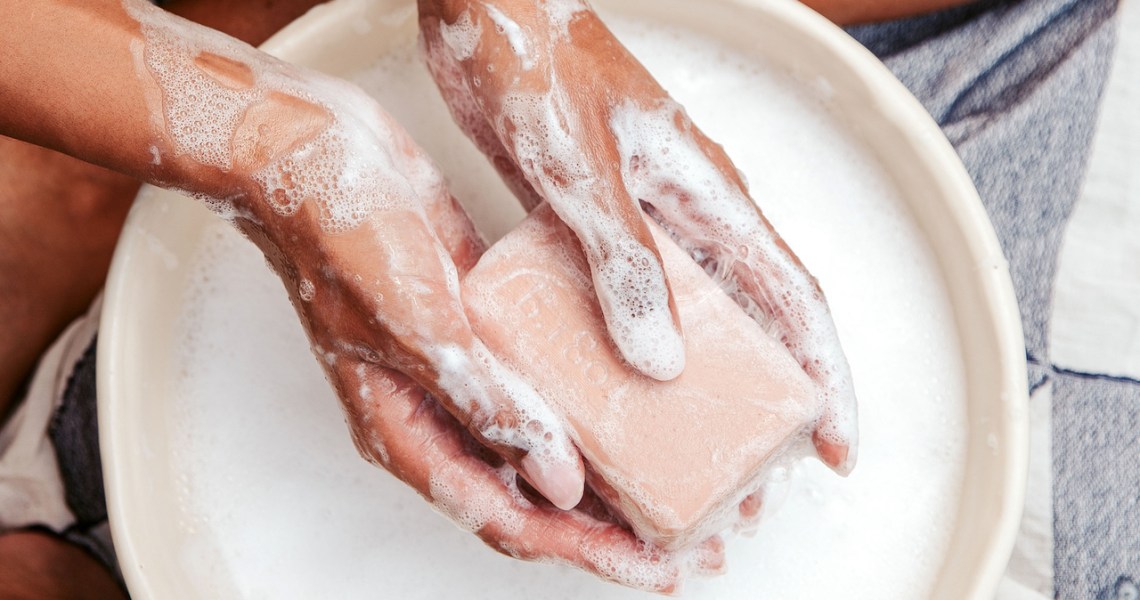As work-from-home culture means less of a need for prestige cosmetics, beauty companies are emphasizing personal care products like soap to reach consumers stocking up on essentials.
Consumer behavior has shifted toward personal care as a result of the Covid-19 stay-at-home directives. Hand soap was the most-purchased personal care product within the past two weeks, according to a survey of a sample group of 1,000 consumers by Poshly. The consumer insights platform also found that 79% of respondents said they had increased their hand soap usage and 73% had increased hand sanitizer use.
Products like soap and hand sanitizer are also becoming logistically easier to manufacture and ship due to state business closure orders for manufacturers of items deemed non-essential. As of April 7, all but eight states in the United States have statewide shelter-in-place or similar orders, many of which require all non-essential businesses to remain closed. The definition of “essential” varies from state to state, but generally includes cleaning and sanitizing products in the personal care category.
Beauty brands have been posting more images of soap and personal care items on social media since the pandemic began. In March, Credo Beauty posted a handwashing guide in promotion of soap brand Soapply, which launched a “Handwashing 101 toolkit,” while Drunk Elephant promoted its bar soaps on Instagram Stories. Herbivore Botanicals also created Instagram Stories ads for its soap last month, as well as a shoppable Instagram post that emphasized that the soaps could be used for hands as well as face.
“Soap and cleanliness are top of mind for consumers at the moment, so naturally our social posts on Herbivore’s bar soap have been most popular with our audience,” said Tran Ngo, the senior director of e-commerce at Herbivore Botanicals.
Beekman 1802, a beauty brand that uses goat milk in its soap and skin-care products, has seen its e-commerce sales more than double during the quarantine period.
“We are known for our soaps, and part of our historic message has been that most of the soaps you buy are full of ingredients that strip the skin.” said Josh Kilmer-Purcell, co-founder of Beekman 1802. “Because people are washing so much, the circumstances are doing our job for us. People now more than ever realize what the ingredients [in] a lot of these products are doing to their skin.”
Ad position: web_incontent_pos1
Beekman 1802, which primarily sells via home-shopping channels QVC and HSN, its e-commerce site, wholesale and a now-closed physical store, is currently selling inventory that has already been manufactured at different locations across the U.S.
Brands that are still manufacturing need to comply with the “essential products” regulations of each state they are producing in.
“Every state has different guidelines, but soap and hygienic products fall into every guideline that we can see,” said Kilmer-Purcell. The brand manufactures all of its products in the U.S. with production in Upstate New York and other states. New York state regulations currently define essential manufacturing to include “sanitary products including personal care products regulated by the Food and Drug Administration.”
But beyond serving public good, a shift to personal care products for beauty brands allows businesses to carry on in states that have essential-versus-non-essential guidelines in place.
“Cosmetics and fragrances do not qualify as essential,” said Mike Cole, a senior director for supply chain solutions at Inmar Intelligence. “The response from larger brands has been to transition to producing hand-sanitizing products to remain essential and maintain their workforce.”




